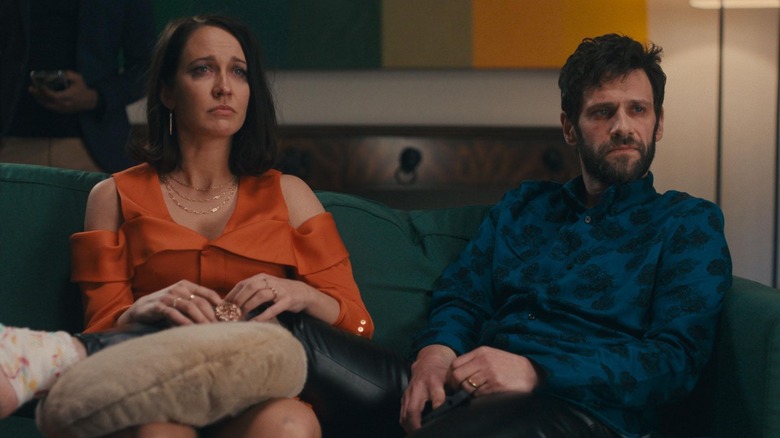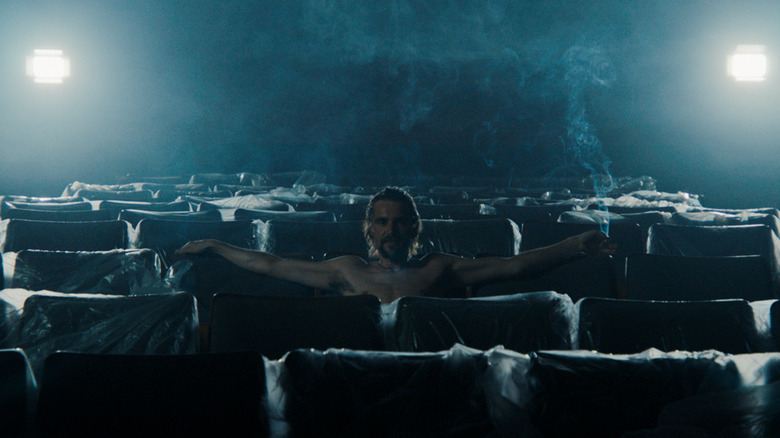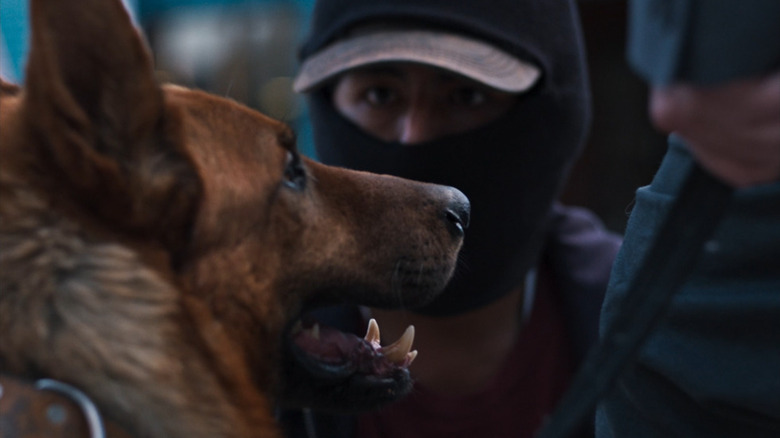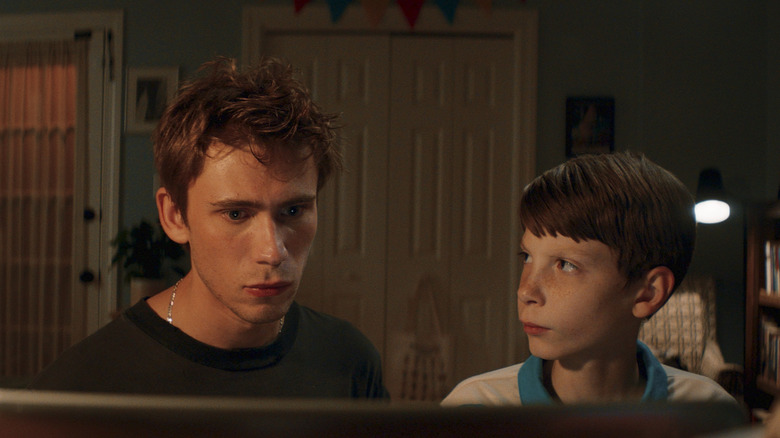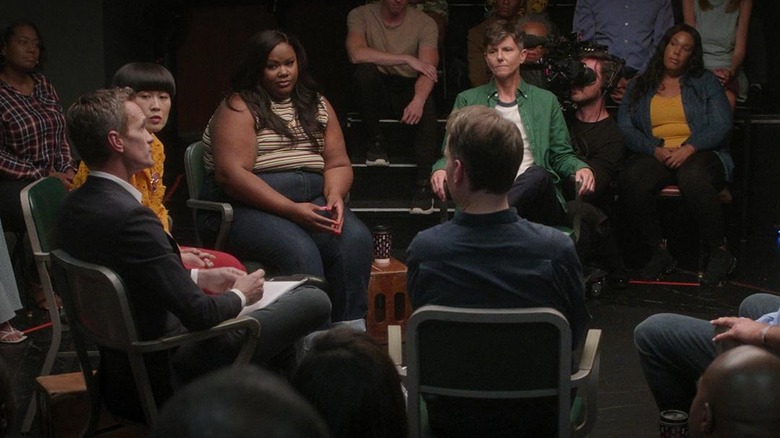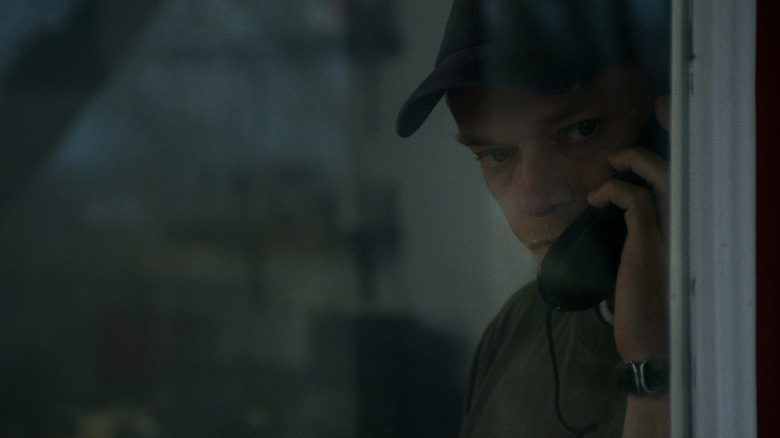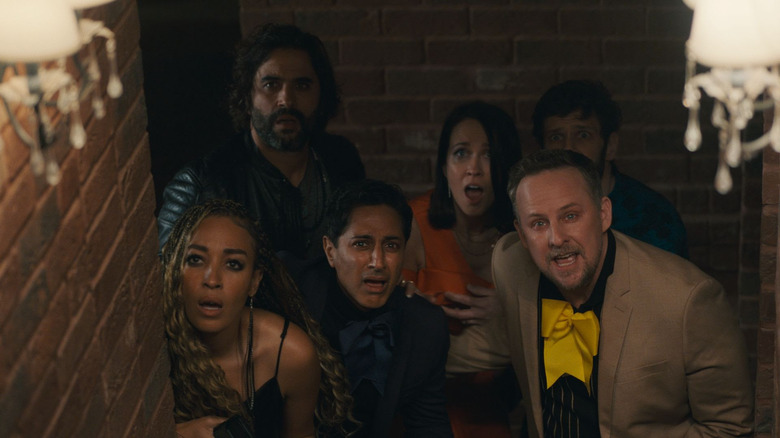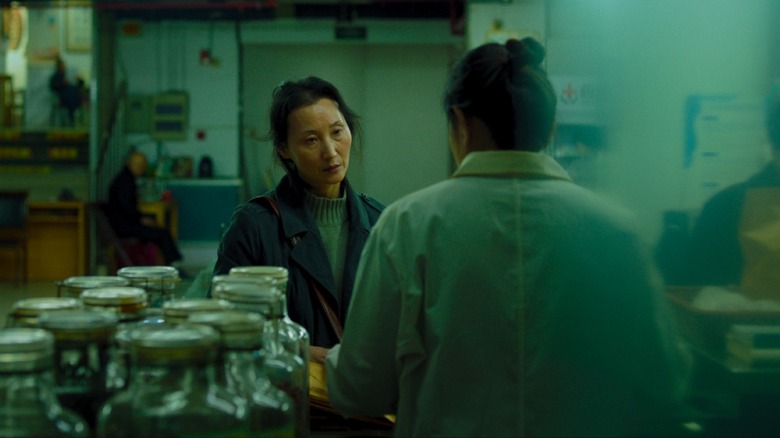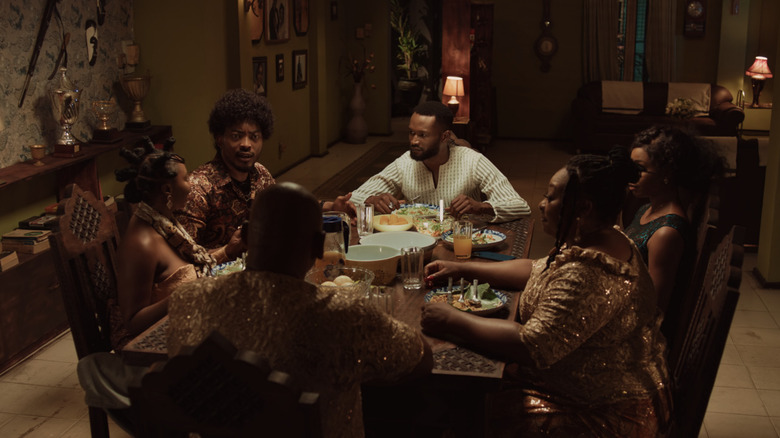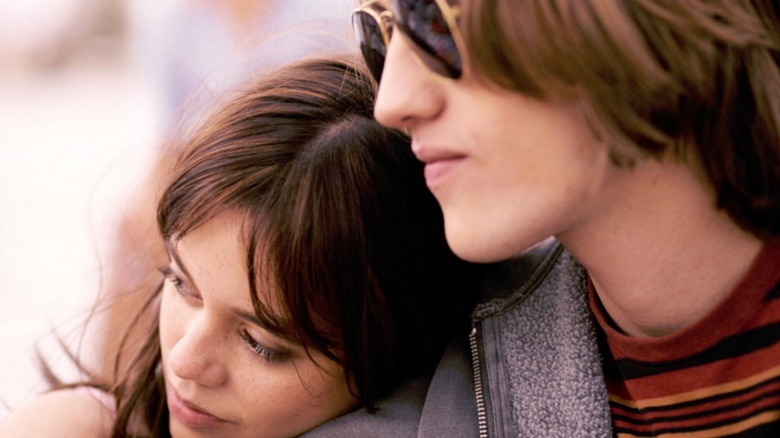The Best Movies We Saw At The 2024 Tribeca Film Festival
New York City's annual Tribeca Festival always brings something for everyone: from its series of short films made by all the most promising up-and-coming talent to several documentaries about a wide range of topics to the buzzy narrative features both international and close to home, all vying for Tribeca's various top prizes. Co-founded by none other than acting legend Robert De Niro in the aftermath of 2001's 9/11 attacks in an effort to revitalize the Tribeca neighborhood located in Lower Manhattan, the film festival has carefully curated its own identity over the years. While its famous big brothers like Cannes, Sundance, and the Toronto International Film Festival will always receive the bulk of attention, Tribeca tends to feel like the scrappy, blue-collar breeding ground for all the most under-the-radar offerings that the indie system has to offer.
This year's event was no exception, providing all sorts of opportunities for the curious and open-minded moviegoer. For the purposes of this Tribeca roundup, we're including all the films that we didn't have a chance to go long on with full-fledged reviews. There were plenty of those, however, between propulsive horror films like "The Damned," light and airy road-trip comedies such as "Sacramento," understated coming-of-age movies like the Lily Gladstone-starring "Jazzy," and intense psychological dramas in the vein of Naomie Harris' and Natalie Dormer's "The Wasp." That only scratches the surface of Tribeca as a whole, however. In that spirit, we've collected all our favorite first-time watches from the festival and included them for your convenience below.
A Desert
This movie boldly answers the question, "What if 'Psycho' was twice as weird, thrice as disturbing, and it didn't include that portion at the end where a psychiatrist over-explained the bad guy's whole deal?" This film refuses to elaborate on the nature of its villains and the sheer extent of their predatory behavior, and that's its main strength. Some might be disappointed by the lack of clarity, but if you've ever felt alone and unsafe in an unfamiliar area, you won't need any more details than "A Desert" gives you.
Despite its deceptively simple premise — a man wanders into an abandoned rural area and comes across some suspicious locals — "A Desert" has a ton of things to say. It's about the exploitative nature of film, the decadence of abandoned rural areas, the quiet perseverance of women in a world filled with dangerous men, and a ton of other things that probably flew by me on first viewing. Featuring a nauseating (but somehow also delightful) villain performance from Zachary Ray Sherman, this film is a must-see for fans of sophisticated depravity. (Michael Boyle)
The Dog Thief
Slow and contemplative, this film's unlikely to ever be a major box office sensation, but that doesn't mean it's not worth watching. It starts off as a simple story about a boy who steals a man's dog in the hope of giving it back for the reward money, but it gradually reveals itself to be something much darker and sadder. It's about a troubled boy's loneliness and his complicated desire for a father figure. The evolving dynamic between the young, poor Martin (Franklin Aro) and rich, enigmatic Mr. Novoa (Alfredo Castro) is both increasingly stressful and surprisingly sweet.
"The Dog Thief" also offers an authentic look into the life of a shoe-shiner in modern-day Bolivia, complete with the casting of an actual shoe-shiner in the lead role. The result is a poignant, morally fraught story, one where you never quite know what will happen next. It helps that there's a cute dog involved, whose acting skills give Messi from "Anatomy of a Fall" a run for his money. (Michael Boyle)
Griffin in Summer
In any festival setting where entire movies can come and go without making a single impression whatsoever, there's something incredibly refreshing about how "Griffin in Summer" announces its presence like Kuzco throwing open the doors with a flourish in "Emperor's New Groove." (No, I wasn't expecting to make that comparison, either.) It takes all of two minutes for writer/director Nicholas Colia to elicit gut-busting laughs and secondhand embarrassment in equal measure, all with an unmistakable wink in his eye, through one of the most effective instances of economical storytelling I've ever seen. Fourteen-year-old Griffin Naffly (a downright revelatory Everett Blunck) performs at his school talent show with an excerpt of a play he's written himself — one that involves him playing both sides of a middle-aged couple in the midst of a heated argument about alcohol addiction, infidelity, and all sorts of material that feels wildly inappropriate coming out of a tween's mouth, yet undeniably hilarious when Blunck delivers every line of melodrama while dialed up to 11.
That table-setting sequence tells us everything we need to know about the movie's title character, an insufferably type-A preadolescent blessed (or cursed?) with the soul of a 45-year-old artiste. Born to be a playwright, Griffin has managed to suck all the fun and joy out of childhood, preferring to stay inside and work on his writing rather than party and throw back hard seltzers with his small circle of friends. But with his frazzled mom Helen (Melanie Lynskey) preoccupied by her failing marriage and his best bud Kara (Abby Ryder Fortson) off with her boyfriend and living life, only the arrival of tough-guy handyman/failed artist Brad (a perfectly-cast Owen Teague) wakes Griffin up like never before. A hilarious and poignant coming-of-age tale, "Griffin in Summer" is a nonstop delight. (Jeremy Mathai)
Group Therapy
Alright, I'll admit it: This one's on me. At Tribeca specifically, the documentary selections tend to be among the highlights of the festival ... yet when "Group Therapy" was brought onto my radar, I dismissed it out of hand. The premise was described as a group of comedians coming together for an impromptu discussion about a whole range of topics, though loosely related to the subject of mental health. Touted as unscripted and uncensored, it was easy to imagine this as some sort of tired screed about "cancel culture" and stand-up comics not being "allowed" to tell the kinds of jokes they used to get away with (although paying a visit to any bar or comedy club in literally any town would put an end to that narrative). Instead, my last-minute perusal of a "Group Therapy" digital screener made me realize just what I'd almost missed out on — and you won't want to make the same mistake I did.
Documentary filmmaker Neil Berkeley's latest feature gathers together a fascinating mix of comedians — Mike Birbiglia, Nicole Byer, Gary Gulman, London Hughes, Tig Notaro, and Atsuko Okatsuka — in an extended panel moderated by Neil Patrick Harris. Early tone-setting clips establish that there was no greater agenda at work here other than an honest, raw, and oftentimes moving conversations about how each performer navigated their professional lives while dealing with various mental health issues they've personally experienced. Intercut between paired-off conversations off-set and footage of actual stand-up routines from years past, viewers are treated to humorous banter between some of our finest improv minds around, bittersweet recollections of past obstacles and tragedies (Tig Notaro's segments are a standout highlight), and even the odd pearl of genuine wisdom here and there. Keep an eye out for this one. (Jeremy Mathai)
McVeigh
What does the life of a hateful extremist look like in the week leading up to him committing the most deadly domestic terrorist act in American history? Well, it's surprisingly mundane. Alfie Allen gives a grim, understated performance as the notorious Timothy McVeigh, the man behind the Oklahoma City bombing in 1995. He's never a cartoonish monster, but there are no excuses made for him either; we're simply forced to watch this racist, vindictive, paranoid man goes about his regular life, unchallenged by any of the people around him.
It's a slow and steady 90-minute character study, one that serves as a much-needed reminder that extremists don't typically announce themselves. Not only are they capable of seeming normal in social settings, but they often don't even see themselves as anything more than ordinary. McVeigh is quietly, casually supported by an entire community of like-minded people, and in the brief moments where he does express his plans to kill 168 people, he goes about it like it's the most clearly justified thing in the world.
"McVeigh" is a quiet meditation on how extremist communities will often casually, undramatically coalesce around each other, in a way that could easily be overlooked by an unfamiliar eye. The film probably could've dove even deeper into its main character's psyche, but what we got was unsettling enough to be worth the watch. (Michael Boyle)
Nuked
In 2018, Hawaii experienced perhaps the most terrifying close call since the Cold War, when an alert was mistakenly sent out informing citizens of an impending nuclear strike; what director/co-writer Deena Kashper took away from this absurd series of too-real events apparently was, "What if we made an entire comedy about this emergency?" The end result is "Nuked," an irreverent and weed-infused romp that feels like the twisted lovechild of 2022's "The Menu" and 2013's "This Is the End," yet remains unmistakably its own thing altogether.
"Nuked" takes the most basic of premises — married couple Jack and Gill (Justin Bartha and Anna Camp, respectively) are celebrating their joint 40th birthday with an "Unplugged party" (meaning they must hand over their phones for the night) at a lavish countryside estate with some of their closest friends from college — and spins out an increasingly unhinged story about what happens when we're forced to be completely honest with those we claim to love most. The party involves a collection of familiar archetypes with a refreshingly original twist, from Gill's internet-addicted influencer/podcaster and Jack as a man desperate to become a father to the gay couple on cruise control (Maulik Pancholy and Stephen Guarino) to the workaholic husband (George Young) and stay-at-home mom (Lucy Punch) running on fumes to the bad-boy rocker (Ignacio Serricchio) who still harbors feelings for his free-spirited ex (a scene-stealing Tawny Newsome).
Throw this boiling cauldron of emotions and fascinating character pairings together, add the impending threat of nuclear annihilation once one guest can't stop themselves from checking their phone at the most inopportune moment, and all the ingredients are there for the year's funniest and most heartfelt comedy that perfectly sums up our collective pandemic experience. (Jeremy Mathai)
Some Rain Must Fall
Movies about aimless people stuck in a rut in their lives and struggling to break free can sometimes feel as purposeless and meandering as the characters themselves, but that only makes "Some Rain Must Fall" all the more impressive considering how it goes about telling its central story. Played by Yu Aier in a performance that deservedly won her Tribeca's Best Performance Award, Cai is a 40-something housewife in her home country of China who's clearly at something of a crossroads. We meet her as she distractedly wanders into the gymnasium where her daughter's basketball game is currently being held and answers a phone call (only her side of which we can actually hear) that doesn't go very well at all. Noticeably holding back a whirlwind of emotions, a stray basketball happens to hit her at the worst possible moment and, when she hurls it back with all the force of the inner storm raging inside, the injury she inadvertently inflicts upon an elderly bystander causes her to spiral out of control and finally confront what she truly wants out of life.
It's an unexpected sequence of inciting action for a film about such existential concerns, but writer/director Qiu Yang constantly showcases a knack for finding the most subtle and overlooked moments of inspiration. With a camera almost oppressively locked in on Cai at all times — we never actually see the old lady she injures, while other side characters remain at the very outskirts of the narrative — we're nonetheless carried along by a confident grasp of storytelling, steadily unveiling a full portrait of a lady whom the entire world seems to be against. By the end of the film and its memorable final moments, "Some Rain Must Fall" finds meaning in the mundane. (Jeremy Mathai)
The Weekend
Although this Nigerian thriller suffers from some clunky dialogue and takes a little too long to get to the point, the rising tension is strong enough to mostly hold it all together. Most of all, "The Weekend" is surprisingly fun, even if everything about its subject matter implies a miserable time. The Tribeca website compared it to "Ready or Not" and "Get Out," two movies that seemed to be competing to see who could come up with the worst possible family an unsuspecting person could marry into; although this film's screenplay isn't quite as tightly written as "Get Out," it definitely holds its own in the "terrible in-law" department.
The real excitement here is not in figuring out the big twist, which should be pretty easy for most well-versed viewers, but in seeing how this insane premise will shake out. And what makes this family even more unsettling is how their banter and bickering is still sweet and relatable, even after we learn the truth about them. These people may have a creepy, unsettling tradition they cling to, but besides that they seem like a fun hang. That central, compelling contradiction helps the whole thing shine. (Michael Boyle)
Winter Spring Summer or Fall
Jenna Ortega is charming as hell in this teen romantic comedy. She plays the goody-two-shoes Remy, a high school senior with Harvard on her horizons, who suddenly finds herself pulled towards charming slacker Barnes (Percy Hynes White), a guy with no plans for his future at all. Although the dynamic between the two teens isn't exactly reinventing the wheel as far as YA romances are concerned, there's enough chemistry and intrigue to make the whole thing worth it. This film understands just how fragile and fleeting young love can be, yet it tempts us to believe in this likely-doomed romance anyway.
At 97 minutes, this film is helped a lot by the fast pacing. Barring one questionable detour in the final act, "Winter Spring Summer or Fall" gets right to the point and doesn't linger too long after. If you're looking for a fun time, or you're just a fan of Ortega's filmography in general, this one's definitely worth the watch. (Michael Boyle)
